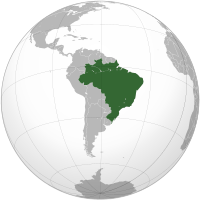
Rio de Janeiro, or simply Rio, is the capital of the state of Rio de Janeiro. It is the second-most-populous city in Brazil and the sixth-most-populous city in the Americas.

Ipanema is a neighbourhood located in the South Zone of the city of Rio de Janeiro, Brazil, between Leblon and Arpoador. The beach at Ipanema became known internationally with the popularity of the bossa nova song, "The Girl from Ipanema", written by Antônio Carlos Jobim and Vinícius de Moraes.

The Carnival of Brazil is an annual festival held the Friday afternoon before Ash Wednesday at noon, which marks the beginning of Lent, the forty-day period before Easter. During Lent, Roman Catholics and some other Christians traditionally abstained from the consumption of meat and poultry, hence the term "carnival", from carnelevare, "to remove meat."

São Paulo LGBTQ Pride Parade is an annual gay pride parade that has taken place in Avenida Paulista, in the city of São Paulo, Brazil, since 1997. It is South America's largest Pride parade, and is listed by Guinness World Records as the biggest pride parade in the world starting in 2006 with 2.5 million people. They broke the Guinness record in 2009 with four million attendees. They have kept the title from 2006 to at least 2016. They had five million attendants in 2017. As of 2019 it has three to five million attendants each year. In 2019, it was also the second larger event of the city of São Paulo in terms of total revenue and the first in terms of daily revenue. In 2010, the city hall of São Paulo invested 1 million reais in the parade. According to the LGBT app Grindr, the gay parade of the city was elected the best in the world.

Laranjeiras is an upper-middle-class neighborhood located in the South Zone of Rio de Janeiro, Brazil. Primarily residential, It is one of the city's oldest neighborhoods, having been founded in the 17th century, with the construction of country houses in the valley located around the Carioca River, which bordered Corcovado Mountain. Because of this, the neighborhood was previously called Vale do Carioca, or Carioca Valley.
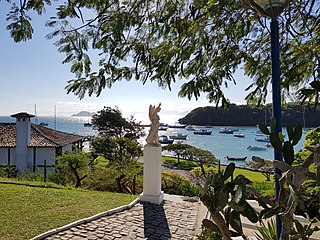
Armação dos Búzios, often referred to as just Búzios, is a municipality located in the state of Rio de Janeiro, Brazil. It is 173 km east of the city of Rio de Janeiro. By 2020, its population consisted of 34,477 inhabitants and its area of 71 km2. Today, Búzios is a worldwide tourist site.

Lesbian, gay, bisexual, and transgender (LGBT) rights in Brazil rank among the highest in the world. Same-sex couples in Brazil have enjoyed the same rights guaranteed to heterosexual ones since 16 May 2013, including marriage and adoption. On June 13, 2019, the Brazilian Supreme Court ruled that discrimination on the basis of sexual orientation and gender identity is a crime akin to racism.
Carlos Tufvesson is a fashion designer in Brazil. He attended Domus Academy, in Milan, Italy. In 2000, he opened a space in Ipanema: One side his atelier, the other a store front. In 2001, he released his first prêt-à-porter collection during the Semana Barra Shopping, a precursor event to Fashion Rio. In 2004, Tufvesson introduced his work internationally at the São Paulo Fashion Week.

Centro is a neighborhood in the Central Region of Rio de Janeiro, Brazil. It represents the financial heart of the city, and the crux of the Central Region.
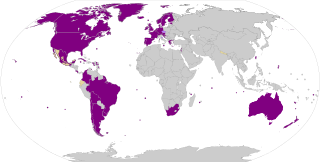
Same-sex adoption in Brazil is legal according to the Superior Court of Justice of Brazil, as stated in a court decision on April 27, 2010. The change was a milestone in the country's LGBT history.
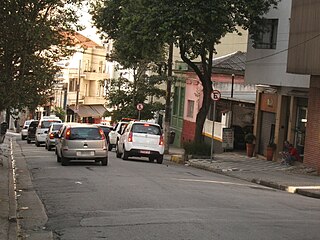
Frei Caneca Street is an important LGBT Street in the city of São Paulo, Brazil, that starts at the Paulista Avenue and ends at Caio Prado Street. The street contains the famous gay nightclub A Loca and LGBT-friendly shopping at Frei Caneca.

LGBT people in Brazil represent an estimated 8.35% of the Brazilian population, or approximately 20,000,000 people.

LGBT tourism in Brazil is a form of niche tourism marketed to gay, lesbian, bisexual and transgender (LGBT) people who come to Brazil. The city of Rio de Janeiro was elected the best LGBT destination of the world, according to the U.S. Logo channel, owned by Viacom's MTV Networks. Rio de Janeiro also was elected the most sexy city of the world to LGBT people, according to the U.S. Logo channel and TripOutGayTravel. In 2014, Brazil and the United States were the two countries more wanted by international LGBT tourists, according to the World Travel Market.
Aldeia Campista was a neighborhood in Rio de Janeiro, Brazil, close to contemporary Vila Isabel, Tijuca, Maracanã and Andaraí.

This article is intended to give an overview of the history of LGBT rights in Brazil.

Lesbian, gay, bisexual, and transgender (LGBT) rights are liberal in Rio de Janeiro. Same-sex marriage is legal in the state.
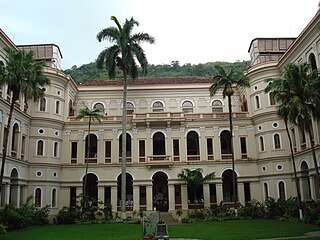
St. Ignatius School, Rio de Janeiro, is a Brazilian private, Catholic school, located in the neighborhood of Botafogo in the South Zone of the city of Rio de Janeiro. It serves students from kindergarten through secondary school, and includes also a night school for youth and adults.

Marielle Franco was a Brazilian politician, sociologist, feminist, socialist and human rights activist. Franco served as a city councillor of the Municipal Chamber of Rio de Janeiro for the Socialism and Liberty Party (PSOL) from January 2017 until her assassination.

David Michael dos Santos Miranda was a Brazilian politician. He was a Federal Congressman representing the state of Rio de Janeiro, serving from 2019 until 2023, and was affiliated with the Democratic Labour Party (PDT), after switching parties from the Socialism and Liberty Party (PSOL) in 2022. Prior to that, he was a City Councilman representing the city of Rio de Janeiro. Miranda also played a key role in Edward Snowden's global surveillance leaks.


















